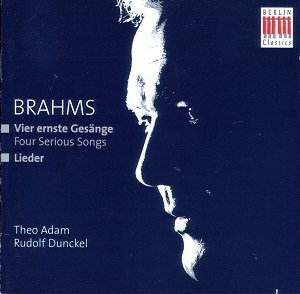Theo Adam is most widely known as a great Wagnerian
bass-baritone, remembered for such roles as Hans Sachs and Wotan, and
also renowned for his assured, reverent singing of Bach. This CD reminds
us that Adam was also a Lieder singer of some distinction, using his
clear, manly voice and crystalline diction in the service of composers
such as Brahms. He has strong competition in the current catalogue,
although until Matthias Goerne gets around to recording these songs,
there remains no obvious clear recommendation as the definitive version
of these wonderful pieces. The most obvious comparison is with Quasthoff,
but if you want both his 'Vier Ernste Gesänge' and other songs
such as 'Wie bist du, meine Königin?' you will need to buy two
separate DG recordings.
'Der Tod, das ist die kühle Nacht' is finely sung,
with a wonderfully sonorous low note at 'Tag,' but Adam does not give
quite enough to the word 'müde,' and although he takes the dramatic
outburst at 'Liebe' very well, his voice carries but little sense of
the necessary rapture. The same applies to 'Nicht mehr zu dir zu gehen,'
which is solidly and strongly phrased but lacks the ideal quality of
obsessive attachment which Quasthoff brings to it, and phrases such
as 'verlor ich' need a much more poignant emphasis.
The lively, folk-like 'Sonntag' finds both singer and
pianist at their best; this is very fine singing and playing, perfectly
catching the dance - based style and natural inflexions of the speaker;
I played it again immediately after the first hearing and have done
so many times since - I love the way Adam caresses the phrase 'tausend
schöne jungfraülein.'
Rudolf Dunckel plays 'Wie bist du, meine Königin'
superbly, although he misses some of the soulful, romantic emphasis
given to it by Justus Zeyen, and whilst Adam certainly sings it with
lovely, unforced tone, he still does not equal Quasthoff's darkly troubled,
obsessive phrasing and his authentic note of enraptured bliss at the
repetitions of 'Wonnevoll!' Adam's singing of this word sounds warmly
paternal rather than ecstatic, and in general the singing here is a
little too safe to compete with Quasthoff.
The 'Vier Ernste Gesange' is amongst the greatest works
in the repertoire, and Adam's performance is one of real stature, whilst
never quite approaching the heart's desire - but then, whose performance
does? Both Fischer-Dieskau and Quasthoff turn in fine, sensitive, dramatic
readings, and Theo Adam's is well up there with them, but anyone present
at Matthias Goerne's recent Wigmore Hall Brahms recital will understand
the remark that these songs have yet to meet their match on disc, since
his reading, and that of Leif Ove Andsnes, was as searingly dramatic,
grippingly word-sensitive, tenderly poetic and freshly conceived as
it is possible to imagine. However, if you seek a version that is very
finely sung without being over-emphasized, you could do a lot worse
than to opt for Adam and Dunckel's. 'O Tod, wie bitter bist du' is taken
very slowly, with beautifully sustained legato, and 'Wenn ich mit Menschen..'
captures that necessary contrast between the swagger of the beginning
and the heightened dramatic tension at the end.
Overall, a fine disc which serves as a worthy introduction
to one of the greatest bass voices of our time, with some very fine
singing; it may not have the vocal gloss and touching tremolo of Quasthoff,
but it is undoubtedly a great voice which deserves to be heard in this
repertoire, and it is supported by incisive, musical accompanying; a
pity, however, that no texts are supplied. The recording is clear, with
minimal echo and surrounds both voice and piano with a sense of space
and refinement.
Melanie Eskenazi


